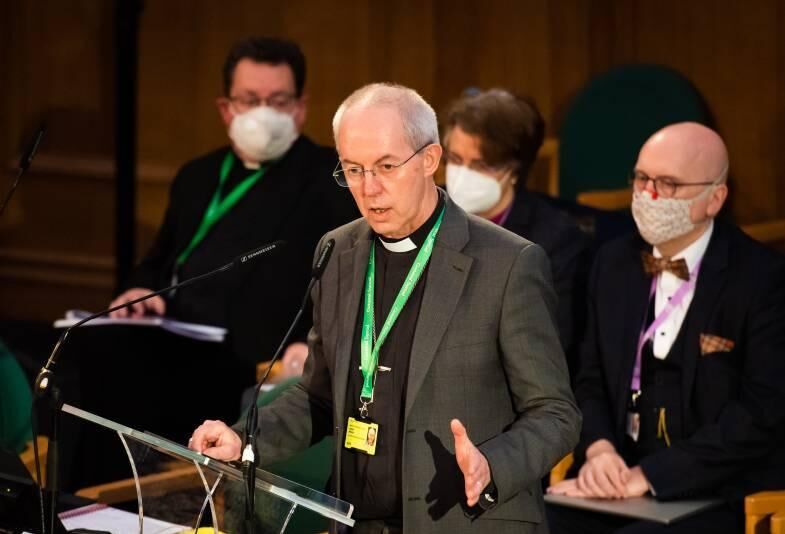Justin Welby resigns: how can we respond?

Warning: This article contains descriptions of abuse and covers sensitive themes. It may not be suitable for all readers. Please read with caution.
It has felt like a long - and painful - week. More than 5 years after it was first commissioned, and more than 40 years since abuse first occurred, the Makin report, the Church of England’s investigation into its handling of abuse allegations against John Smyth, was finally released last Thursday.
Its findings were devastating, and deeply disturbing: John Smyth had appeared to be a charismatic personality, a regular leader on the Iwerne camps (originally founded by Eric Nash, and through which various evangelical leaders have passed), and the lawyer for Mary Whitehouse in various high-profile cases.
In reality, he was “a skilled and determined narcissist, who derived pleasure from the sufferings of others.” He abused around 130 teenage boys, including his own son, physically, spiritually, emotionally, and sexually. Beginning around 1976-7, he “groomed” teenagers to the point where they would meet him in his garden shed (which he would later sound-proof, to preserve secrecy) and he would administer vicious beatings with a plimsoll or a cane to victims on the back or buttocks (sometimes having undressed them himself), in order to supposedly help them to fight against sin.
One told the Report: “I had a sense that each cane stroke had left its own mark on my body, however when I was beaten more than 30, or even as much as 100 times, there was no sense of any individual stroke marks...just a bloody mess.” Another said, ““I remember thinking ‘he’s going to kill me.’ I was that scared...”
One victim was reportedly beaten more than 800 times in a single day.
To help grasp the scale, and the damage, of Smyth’s behaviour, I am quoting various portions from the Makin Report, and in particular, statements from the victims, in full below:
“In addition to sin-related physical abuse, John Smyth also introduced the concept of “training beatings”, not related to a particular sin, but as a further means of (in his terms) “getting closer to God”” (p. 48)
“John Smyth would drape himself over the victim, before and after the beating, sometimes kissing them on the neck or back. The accounts from victims and the details which follow, as we explore the chronology of the increasingly frequent beatings, describe an aberrated and clearly sexually motivated, sadistic, regime” (p. 49)
“A victim has described to us how John Smyth indicated he should self-harm after he discussed his sexuality during a meeting with John Smyth in Peter Krakenberger’s Winchester College flat. John Smyth suggested this as a path to fighting sexual feelings that he was having. The victim was so traumatised by this guidance that he attempted to take his life.” (p. 50)
Much more could be written. Indeed, in the report, John Smyth is described as “possibly, the most prolific serial abuser to be associated with the Church of England.”
What did this have to do with the Archbishop of Canterbury?
John Smyth is believed to have begun his grooming of many of the boys on the Iwerne camps (he was chair of the Iwerne Trust at the time) in the mid-1970s, at which Justin Welby was a leader at the same time. However, although Welby was warned that Smyth was “really not a nice man” in 1981, there is nothing concrete to indicate that he had any idea of the scale of the abuse until becoming Archbishop of Canterbury in 2013.
At that point - while Smyth was still alive in South Africa - Welby was informed of the allegations against Smyth, and said that he had known him personally in the 1970s. He was advised that the police had been made aware, but did not follow up on this, and did little more until 2017, when the abuse (and his own connection with Smyth) was made public via a Channel 4 documentary. Having committed to meet with the victims, he did not do so until 2021.
After the publication of the Makin report, pressure was put on him last weekend by a petition begun by three members of the Church of England’s General Synod, Ian Paul (an evangelical), Robert Thompson (a liberal LGBTQ activist) and Marcus Walker (an anglo-Catholic). The petition had more 10,000 signatures within 48 hours. On Monday, the Bishop of Newcastle, Helen-Ann Hartley became the first bishop to publicly call for his resignation. By Tuesday, he had tendered his resignation to the King.
But Justin Welby was only the most high-profile figure mentioned in the report. Others, including many known and widely-respected figures within the evangelical world, had known about the abuse to some extent.
Abuses were known to leading figures in the Iwerne Camps (which in theory, fell under the remit of Scripture Union, even if in practice, they ran fairly autonomously) by 1982, when a victim contacted David Fletcher, who was responsible for the Iwerne camps at the time. In March 1982, a report was written by Mark Ruston about the abuse, having met at least 13 victims in person. The report was circulated around seven key figures within the Iwerne network.
In short, there was no doubt at this point as to what Smyth was, and what he was doing. David Fletcher described the abuse on the phone to Mark Ruston as “passive masochistic homosexual activity".
Instead of making Smyth’s behaviour known to the police, the leadership of the Iwerne camps swore one another to secrecy, and warned Smyth not to misbehave again, and did not alert the authorities.
In 1984, Smyth moved to Zimbabwe (possibly at others’ bidding), and continued to abuse teenage boys, resuming his beatings and regularly showering and swimming naked with them. While he was there, a boy was found dead in a swimming pool, and Smyth charged with ‘culpable homicide’, only for the case to collapse after the prosecutor was found to have a conflict-of-interest. Increasing numbers of people in the UK became aware of his abuse during this time.
Smyth later moved to South Africa, where he continued to perpetrate abuse. He was only exposed via the Channel 4 documentary in 2017. He died in 2018, before he could be brought to justice.
How are we to think about the events of the last week; and indeed, of all that went before it? I am still attempting to process much myself; the details are so graphic and gruesome, and the cover-up (and those implicated) so deep, that it is difficult to separate out my emotions.
I feel a deep sense of anger, for a deep injustice has been committed. I feel, to be quite frank, a revulsion for the way in which not just John Smyth, but others who decided not to go to the police, have behaved. And I feel almost overwhelmed by the horrors which teenage boys faced, which feels so alien to my own experience of camps and of youthwork.
I hope that the following reflections might provide something of wisdom as you try yourself to process your response to what has occurred.
1. Do NOT play political games with this
Much ink has been spilled in recent days about the position of Justin Welby, and his decision to resign. This is understandable, given his public profile and own personal failures within the case. But I do worry about the way some Christians have been speaking about it.
Justin Welby did not have many allies in the Church of England (as seen by the diverse list of sponsors of the petition last weekend).
His stock had probably never been lower within the evangelical church; his handling of the debates around sexuality and marriage had led to the proposal of Prayers of Love and Faith, involving the blessing of same-sex-relationships. He had - seemingly - announced his own private change in doctrinal belief on a podcast with Alastair Campbell and Rory Stewart a couple of weeks ago. Many felt that - and some were calling for this already - this ought to have been a resigning offence: the Primate of the Church of England seemingly no longer believed in the teaching of the Church of England.
As such, it feels like some have seen the Makin Report as a tactical stick to beat him with, as if safeguarding and the trauma of victims were little more than a political football. Others are celebrating his departure.
This would be a grave mistake. This is not a week of celebration. It is a week of deep institutional and personal failure; a week of cover-up and deception; a week where an abuser ought to have faced punishment for appalling crimes against victims, and due to the inaction of various people, he did not.
It is a week which has its roots in a story of horrible abuse, which was allowed to continue by the gross negligence of countless people, and in which the person who was the figurehead for C of E safeguarding did not fulfill his duties adequately.
According to Psalm 82, God presides with justice in the great heavenly assembly, and says:
“How long will you defend the unjust and show partiality to the wicked? Defend the weak and the fatherless; uphold the cause of the poor and the oppressed. Rescue the weak and the needy; deliver them from the hand of the wicked.”
The church was called to protect “the weak and the needy”. It failed to do so. Do not play political games with this. There is nothing to celebrate here.
This is a time for lament, and for confession.
2. NEVER use the name of Jesus to cover things up
John Smyth’s actions were, in the truest sense of the world, utterly evil.
But there have always been people who commit abuse. They appear within every walk of life, and indeed, within every tribe in Christendom. The list of names seems to grow ever longer; Bishop Peter Ball, anglo-Catholic; Ravi Zacharias, evangelical; Jean Vanier, Catholic.
What I think I have found so shocking - and abhorrent - this time, is the way in which this abuse was covered up by individuals who knew more than enough to act against Smyth and to report him to the police.
I quote again from the Makin Report:
“The decision was made that the authorities will not be informed (most importantly the police) and that the matter will be “held secret” by this small group…
“The evidence from the time, which includes a great deal of contemporaneous correspondence between the people shown the Ruston Report, shows, clearly, that there were several possible reasons for the non-disclosure: (i) To protect the reputation of the Iwerne movement. (ii) To protect the wider reputation of Conservative Evangelicalism. (iii) To protect the reputations of the individuals involved with Iwerne. (iv) To protect the reputations of the victims’ parents.
“In an interview with us, David Fletcher said: “I thought it would do the work of God immense damage if this were public.””
That final quote from David Fletcher made me feel so angry when I read it.
For the inner sanctum of Iwerne ultimately let John Smyth get away with his actions, and continue to perpetrate his abuse against victims in Zimbabwe and South Africa, and that resulted in the death of at least one young person. “Immense damage to the work of God” has come from not telling the truth, rather than what would have come if they had reported Smyth’s actions to the police.
Jesus warned his disciples in Luke 12: “Be on your guard against the yeast of the Pharisees, which is hypocrisy. There is nothing concealed that will not be disclosed, or hidden that will not be made known. What you have said in the dark will be heard in the daylight, and what you have whispered in the ear in the inner rooms will be proclaimed from the roofs.”
How impoverished is your view of God if you think that his success (yes, his success) could be limited by pursuing truth? Do you really think it depends on you? Yes, we participate in His work, but that is a privilege we undertake by His grace.
The success never depended on us, but on his Holy Spirit. Paul wrote to the Corinthians: “I planted the seed, Apollos watered it, but God has been making it grow” (1 Corinthians 3:6). God is plenty capable enough to accomplish his purposes in spite of our failure. Indeed, isn't that the whole point?
So do not ever use Jesus’ name as a justification for letting evil win, or for covering things up. The Lord has never said that he requires success from us: “What does the Lord require of you? To act justly and to love mercy and to walk humbly with your God.” (Micah 6:8).
The actions of those who covered this up represented none of those things. Don’t play God. Our job is to be faithful. It's his to be in control.
3. Look to Jesus
Look to Jesus.
It feels almost too simple to say. And yet I think it’s probably all that I can say.
The fallout from the Makin Report will be long-lasting. There will be many calls for all sorts of figures to resign, including various bishops and, I suspect, some prominent figures within the conservative evangelical movement. It is likely to be a deeply painful time, as we see some figures who we have admiration for, having their actions and inactions rightly being put under the spotlight.
And although we may want - and try - to move on, for some of the victims of this abuse, that will not be possible. A victim of John Smyth said in 2022, “I was once asked if I still thought about being involved with John Smyth. I replied, ‘No’, but in fact I have done, more than I realise probably, to the extent that at times I have let it define me, like letting what I see in the rear-view mirror distract me from what’s in front.”
Look to Jesus. That's all I can really say.
Following Jesus isn’t comfortable; it means confronting our own sin and repenting of our mistakes. It means recognising that we all - including those we look up to - make mistakes, and sometimes grave ones (indeed, sometimes so grave that one might have to step back from office). And that is as it should be.
As I pondered the words of some of the victims this week, as they described their mangled bodies, I felt upset, angry and confused. How could someone do this to a teenager, “made in the image of God”?
But I know that 2000 years ago, Jesus himself lay hanging on a cross, his body broken, stripped of his clothes, and mocked and spat on by those around him.
As horrendous as this abuse is, at least we believe in a God who understands.
John Stott once wrote, “I could never myself believe in God, if it were not for the cross. The only God I believe in is the One Nietzsche ridiculed as 'God on the cross.' In the real world of pain, how could one worship a God who was immune to it? I have entered many Buddhist temples in different Asian countries and stood respectfully before the statue of the Buddha, his legs crossed, arms folded, eyes closed, the ghost of a smile playing round his mouth, a remote look on his face, detached from the agonies of the world. But each time after a while I have had to turn away.
“And in imagination I have turned instead to that lonely, twisted, tortured figure on the cross, nails through hands and feet, back lacerated, limbs wrenched, brow bleeding from thorn-pricks, mouth dry and intolerably thirsty, plunged in Godforsaken darkness. That is the God for me!”
In Justin Welby’s resignation statement, he closed by saying, “For above all else, my deepest commitment is to the person of Jesus Christ, my saviour and my God; the bearer of the sins and burdens of the world, and the hope of every person.”
There is no other hope to which we can turn, when confronted with such evil, than the God of the cross, who is “the hope of every person”.






